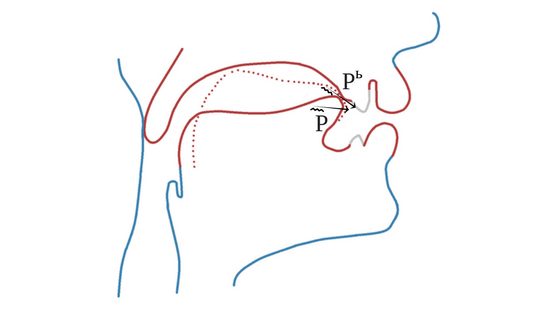Do you struggle with the Russian [р] sound? Your mother tongue doesn’t have any analog, or has the one that differs a lot? You can’t imagine how well I understand you! Although I am Russian, I also suffered from this sound and pronounced it on a French manner till the age of nine. Yes, it is not easy for Russians too, so that quite many adults mispronounce it. In this article, I explain the articulation mechanism of Russian [р] and provide some exercises for practice. Let’s work on it!

Hard [P]
To produce the [р] sound, you need to:
1) Move the back of your tongue up.
To feel this movement repeat the [к] sound several times, focusing on what does the back of the tongue do (it goes up to the palate). Now, fix it in this upper position.
2) Put the tip of your tongue behind the upper teeth. It should touch the alveoles (teeth ridge). You can check yourself with a mirror.
3) Breath out, directing the air flow to the tip of the tongue. Make if quite long and active to force the tongue’s tip vibrate.
4) ‘Turn on’ the voice.
р-р-р-р-р-р….
If it doesn’t work, try the preparatory exercises below. They will prepare your tongue for this unfamiliar articulation.
Preparatory exercises
Speech therapists widely use these exercises in their work with Russian kids and adults.
When practicing them, take a small mirror to help you control the articulation.
«Чашечка» (small cup)
Open your mouth wide, stick your tongue out, and move its tip and its edges up slightly. It looks like a small cup, isn’t it? When articulating [р], the tongue takes the similar curved form.
«Качели» (teeter-totter)
Again, open your mouth and stick your tongue out. Now, with the tip of the tongue, try to touch your nose, then your chin. Repeat this movement several times.
«Грибок» (small mushroom)
Open your mouth widely and stick the flat tongue to the palate.
- Illustration
- In this video, speech therapist shows, how to make the tip of the tongue vibrating with the help of this exercise.
«Гармошка» (accordion)
Fix the tongue in the ‘mushroom’s’ position (previous exercise), then close and open the mouth several times.
«Барабан» (drum)
Open the mouth, stick the tip of the tongue to the alveoles (teeth ridge). In this position pronounce [д-д-д-д-д…] as quickly as possible.
- In this video, speech therapist shows, how to fix the sound [р] with the help of this exercise.
«Маляр» (painter)
Make a smile, open the mouth, and stroke the palate with the flat tongue, as if you painted it with a brush.
- Illustration
- Video on how this exercise can help you to articulate [р]..
Exercises
- дра – дрэ – дры – дро – дру
- зра – зрэ – зры – зро – зру
- гра – грэ – гры – гро – гру
- [др]: драма, дракон, друг, подруга, мудрый, кадр, кедр
- [тр]: трамвай, трагедия, метро, тройка, труба, трубка, метр, центр, театр
- [кр]: красный, круг, вокруг, икра
- [гр]: грамм, градус, гром, группа, игра, фотограф
- [бр]: брат, добрый, брови, добр
- [пр]: праздник, справа, направо, напротив, прыг
- зра-дра-здра – Здравствуйте!
- [ра]: рано, радио, работа, ракета, размер
- [ро]: робот, роза, рот, рояль
- [ру]: рука, руки, рубашка
- [ры]: рыба, рынок, рыбак
- [ра]: гора, пора, гитара, карандаш
- [ро]: урок, пирог, дорога
- [ру]: кенгуру
- [ры]: горы
- [ар]: бар, базар, сахар, загар
- [ор]: мотор, Егор, помидор
- [ур]: тур, Амур, Сингапур
- [эр]: мэр, сэр
- [ыр]: сыр, инжир, Алжир
- [ёр]: ковёр, актёр, боксёр,
- [ир]: мир, кефир, ювелир
Soft [P’]
And now, let’s make the soft [рь] from the hard [р]:
- Stretch your lips slightly to the sides (it will close your mouth a little bit).
- Move the tip of your tongue a bit forward (but do NOT touch the upper teeth). The tip looks down (the main feature of soft consonants).
- Again, breath out intensively enough to make the tip of your tongue vibrating.
рь-рь-рь-рь-рь…
Exercises
- ири – ри: рис, риск, Рим, Рита, ритм, рисунок, три
- ире – ре: редко, грек, крем, Греция, тренер
- иря – ря: ряд, наряд, рядом, прямо
- ирю-рю: рюкзак, брюки, трюк, трюкач
- ирё-рё: берёт, вперёд, орёл, матрёшка
- царь, угорь, Игорь, теперь, Тверь, Сибирь, сентябрь, октябрь, ноябрь, декабрь
- рад – ряд, раб – ряб, ров – рёв, горы – гори, рык – крик, круг – крюк
- спор – спорь, жар – жарь, удар – ударь
- ра-ря-рья: даря – Дарья, моря – Марья
- ры-ри-рьи: дари – Дарьи, Мари – Марьи
- рэ-ре-рье: редко – барьер, курьер, карьера
- ро-рё-рьё: орёл – сырьё
- ру-рю-рью: трюк – дочерью, матерью
These two sounds may be hard to learn if you got used to pronouncing them differently. Most probably, you won’t fix them from the first try (when I was a kid, I had been learning [р] with the speech therapist for about a year and a half). Don’t give up and keep practicing! And don’t feel bad, if you still mispronounce it, many Russians mispronounce it too.
Preparing this article, I used:
- Брызгунова, Елена Андреевна. Практическая фонетика и интонация русского языка : Пособие для преподавателей, занимающихся с иностранцами. – Москва : Изд-во Московского ун-та, 1963. – 306 с.
- Звуки. Ритмика. Интонация : учеб. пособие / И. В. Одинцова. – 4-е изд. – М. : Флинта : Наука, 2011. – 368 с. – (Русский язык как иностранный)
- Индивидуально-подгрупповая работа по коррекции звукопроизношения / В. В. Коноваленко, С. В. Коноваленко, М. И. Кременецкая. – 3-е изд., испр. и доп. — М.: Издательство ГНОМ, 2014. – 216 с.
- And this YouTube channel.

